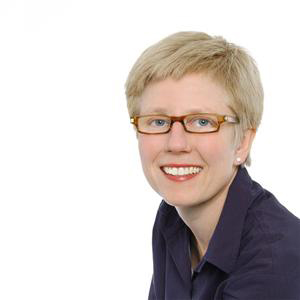
Annette Wulf
Even in the earliest days of the USC Shoah Foundation, a staff of hundreds worked around the world to conduct interviews and create educational materials that used testimony to teach about the Holocaust. Yet, if they were based oversees, they probably never had the opportunity to visit the foundation’s headquarters in Los Angeles. That was Annette Wulf until just a few months ago, when she visited the office for the first time.
A historian and geographer, Wulf joined the staff of the then-five year old Shoah Foundation in 1999 in Berlin. She and the rest of the small Berlin team finished up the last Holocaust survivor testimonies that would be recorded in Germany and began working on the German-language CD-ROM Erinnern für Gegenwart und Zukunft (Remember for Present and Future). Wulf helped edit the articles that would be published on the CD-ROM, identified survivors whose testimonies would be featured, and coordinated the creation of a historic timeline. She also provided administrative support for the office.
By the end of 2000, the CD-ROM was finished. Wulf began a postgraduate course in development studies in 2001 and returned to the Shoah Foundation to help out during the holidays.
Wulf said one of the most memorable moments from her time at the Shoah Foundation was during the beta-testing phase of the CD-ROM, when she was able to see what the finished product would look like for the first time.
“I have enjoyed working with the foundation particularly because of the enthusiasm of the team that worked together on the CD-ROM project,” she said. “That was a strong inspiration, to see how all of them invested up to or even beyond their limits to make the project a success.”
While in Los Angeles on vacation with her husband and daughter this summer, Wulf visited the USC Shoah Foundation office and attended the monthly public visit. The visit gives guests a chance to explore the life stories of survivors and witnesses of the Holocaust and other genocides and to discover how their memories are being used to overcome prejudice, intolerance and bigotry.
“During my time in Berlin, I never had the chance to actually “see” or “experience” how cataloguing was done in L.A,” Wulf said. “I think the foundation is now nicely housed in an inspiring environment, with easy access to both historic and educational research.”
In the future, Wulf hopes that the testimonies in the Visual History Archive, especially the German-language ones, will be more widely available online throughout the country and around the world “for remembrance and education – especially in Germany – about these man-made orchestrated and perpetrated atrocities beyond any ‘human’ description.”